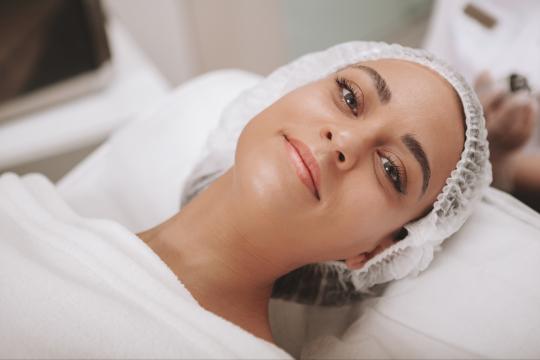
Contemplating a cosmetic surgery is the exact opposite of an impulse purchase. There will be a lot of oversharing and there will be questions. Lots and lots of questions. First you’ll ask questions of yourself, then you’ll ask questions about the credentials of your surgeon, and finally you’ll ask questions about the procedure itself—and that’s where we think this list will come in handy. So grab your pencil, copy and paste, tattoo them onto your flesh for all we care—do whatever you need to do to squirrel this list of questions into the consultation you’ve scheduled with a board-certified plastic surgeon. And once you’re there? Fire away.
Am I a good candidate for this procedure?
The moment you sit down for a consultation with your board-certified plastic surgeon is the moment you cease to be the best person in the room to answer this question, so let’s just leave those pesky control-issues at the door. Your doctor will assess any number of essential factors in determining whether or not you’re a good candidate for plastic surgery. They’ll want to know your current health and medical history, your goals and expectations, any medications you take, etc… There are general guidelines that may make a patient seem like a good candidate for certain procedures, but the reality is that each individual is a special little flower and those general guidelines don’t get to cast the deciding vote (Reminder: That vote will belong to your surgeon.)
What will be expected of me to get the best results?
There are certain things you’ll have to do in order to achieve the best results from your procedure… and the best person to help you source out what those things are, is your surgeon. Make sure you ask for specifics when it comes to doing your part. If your surgeon says rest—do it. If they say wear compression garments—do it. If your surgeon says put a hold on your SoulCycle membership—do that too. Following your surgeons pre- and post-surgical instructions is the best way to achieve the results you’re hoping for. End of story.
What is the length of the recovery period, and what kind of recovery help will I need?
Your recovery period and the type of help you’ll need will vary according to your procedure and individual special flower-ness. We’ve written about the necessity of a really, really good friend when recovering from procedures like tummy tuck, while other procedures like injectable lip enhancement and certain laser therapies have negligible recovery time and you can drive yourself home that very day. Regardless of what the answer is to this question, following your doctors orders to a T is just what the doctor ordered (See what I did there? *wink).
Will I need to take time off from work for my recovery? If so, for how long?
This is one both your bank account and your boss will likely be interested in, so be sure you ask your surgeon how quickly they anticipate you being able to get back to the business of business. (Unless, of course, you’re a lady/lad of leisure. If that’s the case, carry on.) Your doctor will take into account your physical appearance during recovery, how well you’re healing and feeling, and your physical ability to work, so this time period may change post-surgery, but he or she should be able to give you a generalized idea of how long it takes most patients to get back to work.
Are there alternative procedures I could consider? What are their pros and cons?
Your surgeon will likely broach all of the options with you as well, but it’s good to ask the question upfront to ensure that every means to getting the results you want are on the table.
Who on your staff will be performing my procedure and what are their qualifications?
It’s not that you’re not your plastic surgeon’s favorite patient (trust that you are), it’s just that your surgeon can’t always be available to perform every Botox, injectable and laser skin resurfacing or laser hair removal treatment. There are times when your doctor will elicit the help of a skilled and highly trained hand of a licensed Registered Nurse (RN), or a Physician’s Assistant (PA) to perform certain procedures under the close supervision of your physician. Asking after their qualifications doesn’t make you a needy patient, it makes you an informed self-advocate. Well done. And there are other injectable related questions you’ll want to ask too.
What risks and complications are associated with my procedure and how are they handled?
You obviously don’t want to dwell on “worst case scenario” thinking, however, it’s important to know before your procedure what could go wrong and how any complication will be dealt with. Knowing that your doctor and his or her medical team have a plan in place will not only give you peace of mind, but will help you manage your expectations by simply being aware. You’ll be drunk with the power of knowledge. It’ll be great.
What if I’m dissatisfied with the outcome?
Good question. And definitely one you need to pepper into your consultation with your surgeon. Avoiding an unhappy outcome is one big reason why you’ll want to overshare your current health, medical history, lifestyle, and your goals and expectations with your plastic surgeon during your initial consultation. That doesn’t mean being dissatisfied with your results doesn’t happen. Addressing this possibility and understanding what plans your surgeon has in place for secondary or revisionary procedures.
Do you have before and after photos that illustrate this procedure and show results that are reasonable for me to expect?
It’s much easier to imagine the results of your own procedure if you can see someone else’s results with your eyeballs. Asking your surgeon if they can provide cosmetic surgery before and after photos is a great tool for effectively managing your expectations.
Navigating the world of cosmetic medicine isn’t always easy, and sailing through that surgical sea takes a lot of questions. (And alliteration. Apologies.) These 9 questions should be a pretty good start to all of the information gathering and oversharing you’ll need to make an informed choice about whether or not a cosmetic procedure is right for you.



